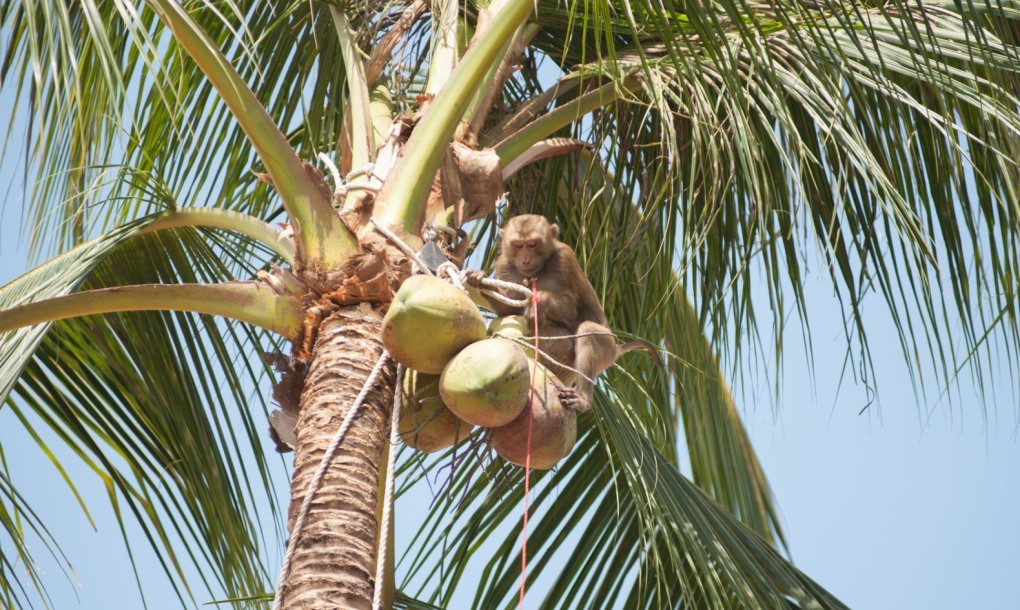

An even more rigorous label for One Voice
A popular source of vegetal butter, coconut oil is in fashion. Unfortunately, a closer look at this industry reveals the callous exploitation of macaques, used in coconut gathering… An additional ethical consideration for One Voice, who have decided to make its criteria even more rigorous.
Misconceived good intentions
The first macaque training school was created in the Thai province of Surat Thani, based on the age-old tradition of using monkeys in arboriculture. This industry is booming; coconut tree related sales and its various by-products (oils, milk, cream, fruit, sap, fibres, leaves and wood) are proving successful for the producing countries: Indonesia, the Philippines, India and Thailand, the main suppliers to the European Union. Sales have been further boosted by consumers looking for palm oil substitutes, following heightened awareness of its links to deforestation …
A useful resource
Harvesting coconuts is arduous and dangerous work, taking place several metres above the ground. The pay (barely 70 bahts (£1.62)) per one hundred coconuts has not improved following the devastating insect invasion in Thai plantations a few years ago. Monkeys are twenty times more efficient and of course don’t need to be paid. They have quickly been identified as a profitable resource. They are also used in the state of Kerala in India, where it is rare for young workers to start careers as fruit pickers.
The monkeys used are the Southern Pig-Tailed Macaques (Macaca nemestrina). Where do they come from? According to one manager:
“Some monkeys are descendants of the ‘beroks’ (captive trained monkeys); others are captured in the forest with nets or traps. Often, nursing mothers must be killed in order to capture their young.”
The acute intelligence of these primates allows them to be “trained” in just a few weeks. This training allows them to identify the ripe nuts and perfect the rotation technique to detach them from the tree. A monkey is capable of harvesting several hundred coconuts per day – up to 1,600 for males and 600 for the females – compared to a human who could only collect around 80. This ability, however, requires a lot of effort from the animal, who is exploited to excess. If the coconut is hard to remove and the macaque stops working, he is quickly reminded to get back to work with a sharp yank on his leash, provoking a cry of pain from the primate. Once all of the fallen coconuts are grouped together, the “master” and his worker move to the next tree, and so on.
A slave’s work
During their training and afterwards (the rest of their lives…), the monkeys have no freedom, their lives are spent chained up or in a cage, with little possibility of socialising. They are not able to behave and interact naturally (in their natural environment they form couples, educate their young, and are free to move about and rest when they want to). These monkeys are transformed into living machines, conveniently used by humans as a continual source of labour, and are even presented as a curiosity to curious tourists who can watch them work.
Other than the harvesting, the monkeys collect fallen coconuts in the thick bushes, gather and transport tools, and load hundreds of coconuts onto lorries… Their life can be summed up by long hours of intense constant work, with zero freedom. Quite simply: slavery.
A label with very high standards
Exploitation of sentient beings in this way is incompatible with the One Voice label, which has been established to guarantee the preservation of the life and integrity of all those who share this planet. Further to the existing criteria stipulating no animal products or animal experimentation in One Voice labelled products, no animal labour is to be used either. One Voice’s charter will be modified to include these criteria.
Several One Voice labelled suppliers who use coconut related products have been consulted regarding this aspect of their production. Despite having various suppliers, they seem to be committed to working with us on this problem and are moving forward with human harvesting techniques. For each One Voice label endorsement, a declaration to this effect will be asked for and verified by independent audit. This will contribute even further to the construction of a non-violent society, for all of the living beings of this planet.